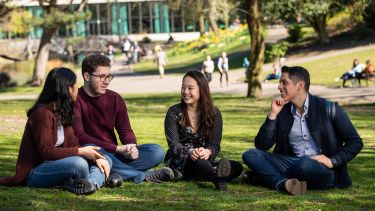Applying my interdisciplinary engineering skills

Why did you choose your course?
One of the main reasons I chose this course over other institutions was that it was aimed at those who have come from a non-biological, engineering background. My undergraduate degree was in mechanical engineering, and I was very interested to learn about how those engineering principles I had learnt could be applied to and help pathologies of the human body.
What have you enjoyed most about your course so far?
So far, I am enjoying the variety of modules! I chose my modules based on the fact I wanted to be exposed to different areas, from bio-imaging to computational modelling (which has been an interest from undergraduate) because this was a new discipline, in a way. You are also highly encouraged to do your own independent reading for your assignments, which makes you aware of the current state of research; now having completed the first semester, it has made me realise that there are many avenues that you can specialise in – all of which are intriguing and there is still a lot to discover!
What do you think about Sheffield as a city?
Sheffield is a quaint city, but it also has many things you would need! For a city, it has many green spaces which are nice if you need a nature break – it’s also right next to the Peak District. I personally like how everything is walking distance but there are also trams that you can take if you’re in a hurry.
Can you tell us about your individual project, and any aspect of it that you’d like to highlight?
My individual project surrounds the use of virtual reality to solve a real clinical problem. It aims to be able to predict the best non-invasive ventilation mask for a patient to save costs (from the current trial and error procedure currently in place). It is an initial challenge as my previous experience with coding has been rather limited, but I also chose it because of the skillset I would develop.
What are your ambitions for the next few years?
This MSc course has reinforced that I would like to continue along the biomedical engineering path. Within the next 10 years, I would like to have gained specialist knowledge in a particular area – as I feel I have just touched the surface of some topics - and use this knowledge to make an advanced impact in the research field and perhaps be able to explore how to apply this in clinical settings.
What would you say to those students who are considering studying biomedical engineering at the University of Sheffield?
Put simply, it has been highly enjoyable so far. If you are not sure about what to specialise in, you don’t necessarily have to at this stage as this course allows you the opportunity to learn about different areas. It is also a good opportunity to consolidate if you really want to go down the biomedical engineering route if you have come a slightly different background. The University of Sheffield is also a good university and has treated me well so far, with plenty of societies and clubs to discover a new hobby. The Students' Union has also been awarded as one of the best in the country and have great flexible jobs for students if you need to earn a little extra!
Meg decided to stay at the University of Sheffield and continues her studies in Biomedical Engineering with a PhD on modelling of blood flows.

International postgraduate taught scholarships
We're offering scholarships worth up to £3,000 to international students joining the University to study a taught masters programme in September 2026.
